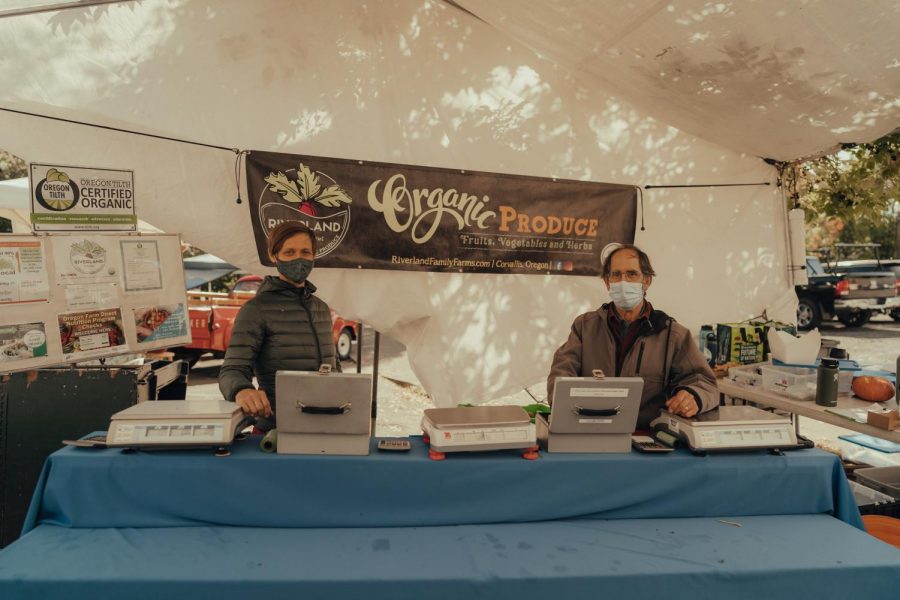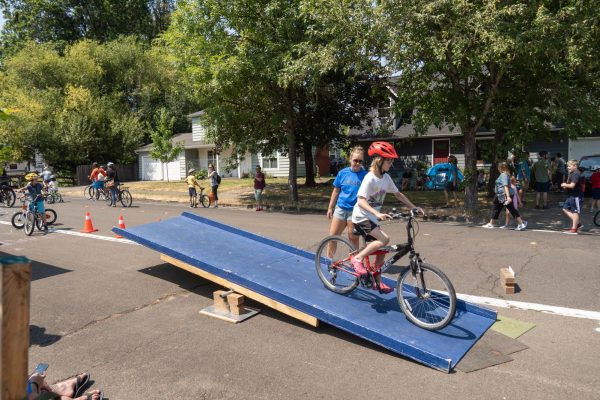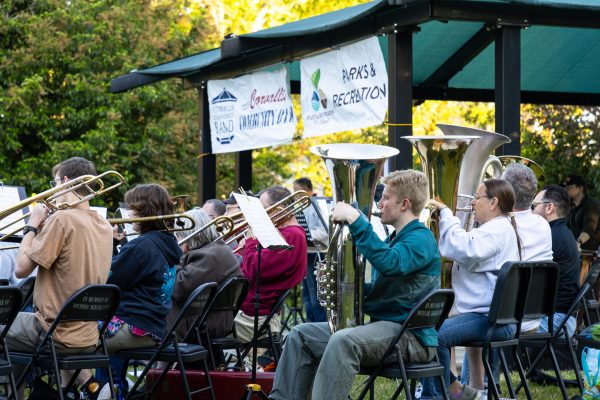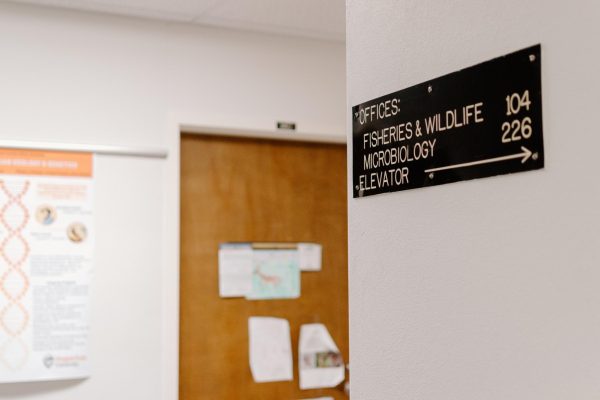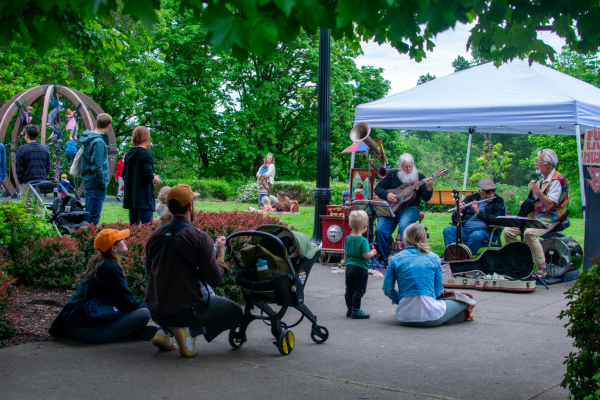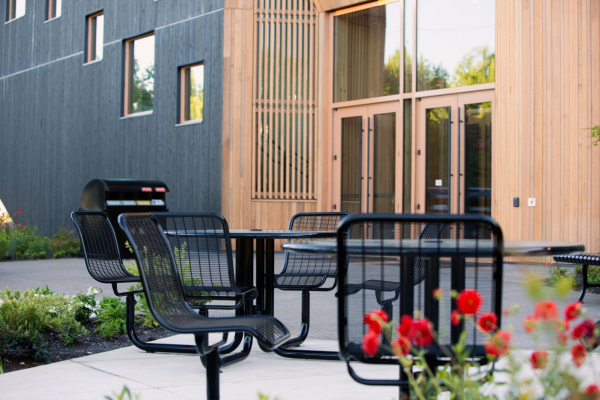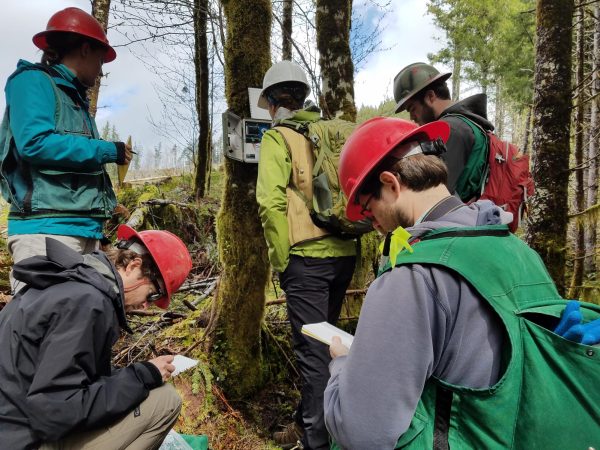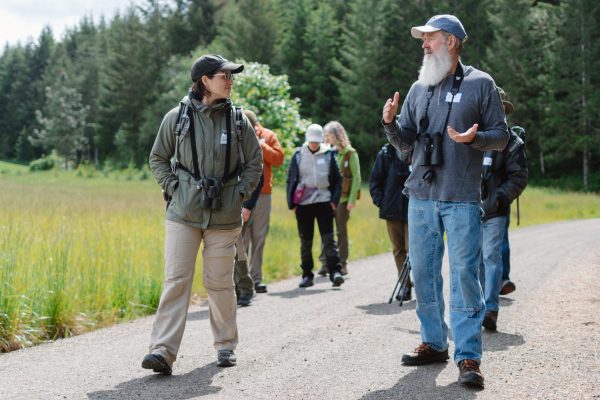Corvallis Farmers’ Market looks toward uncertain, optimistic future
October 11, 2021
As the COVID-19 pandemic continues into its second year, many community members are unsure about the outlook of the Corvallis Farmers’ Market, but remain hopeful.
The Corvallis Farmers’ Market, like most other outdoor markets in the state of Oregon, was able to stay open because it is considered an essential service, like grocery stores.
Earlier this year, the Corvallis Farmers’ Market returned with minor changes to accommodate the pandemic. Now that summer has come to an end and fall is underway, vendors are beginning to examine the effects of COVID-19 on the market, and the outlook for next year.
“Sales are way down from pre-COVID-19; they are about the same as contactless sales,” said Doug Eldon, the stand manager at Riverland Family Farms—formerly Denison Farms—at the Corvallis Farmers’ Market.
According to Eldon, contactless sales meant customers stood six feet away from vendors, six feet apart from other customers and that vendors picked out the produce items customers asked for. This resulted in very little contact with produce and other people, Eldon said, so the risk of transmission was extremely low.
“We had people standing six feet away, and there was no contact; it was safer than a grocery store,” Eldon said as his coworker helped a customer buy strawberries.
Eldon said he was disappointed that some Corvallis citizens have still been opting for standard grocery stores instead of the farmers’ market for their shopping.
“I don’t understand it, this is a lot safer than a supermarket,” Eldon said. “It’s all outside, and with masks and social distancing the risk of getting COVID-19 is incredibly small. But we don’t have contactless services [like Instacart] to get people their products, so sales are down from a third to a half [from pre-pandemic days].”
Instacart is an online service that allows customers to order groceries for pick-up or delivery.
Eldon said Riverland Family Farm’s sales have decreased because of several factors: customers’ overall shopping habits have changed, parking is more restricted as restaurants take up space with outdoor seating and the farm’s change in ownership caused them to lose seniority and the location they had for almost 20 years. For these reasons, Eldon said customers went elsewhere.
Over the past year, the Corvallis Farmers’ Market has faced many changes: no new vendors are currently allowed, the number of vendors has been restricted and the booths spaced out in order to adhere to COVID-19 protocol.
“In general, what we saw from 2019 to 2020 was fewer vendors because some had health conditions that would make them more vulnerable to COVID-19,” said Market Director of the Corvallis-Albany Farmers’ Markets Rebecca Landis in an email. “Or it wasn’t the vendor but a family member or contacts in their other job that required this decision.”
In regards to if COVID-19 restrictions were respected, Landis said that the main issue was group sizes.
“Initially, we encouraged people to send just one person per household,” Landis said. “We were not successful. People came in couples, and many families were not willing or able to leave kids home with one adult. College students were starved for social interaction and came in large groups of six, eight or even 10. Then we tried saying one to two. And continued to get no traction.”
Conversely, Eldon said that most people adhered to COVID-19 restrictions.
“Corvallis residents and regulars were respectful, sometimes we had minimal problems with outsiders not wearing masks, but overall people were respectful,” Eldon said.
Eldon said Oregon State University undergraduate college students are not a large part of his market client base, perhaps because they don’t cook for themselves as much, but encourages students to experience the farmers’ market.
However, Arely Hanson, owner and chef of Pupuseria del Valle—a restaurant that offers authentic Salvadoran cuisine—said OSU students are integral to her business’ success.
“The reduced student population was a big hit for us,” Hanson said. “Much of our customer base is from OSU and we really missed seeing all of the young people. We hope to see more students come back; the markets are a great open air opportunity to spend time together.”
The farmers’ market is much smaller than it was in years past. Before COVID-19, there were bands with live music, samples and hundreds of people on busy weekends. Now, for many weekends the market is quiet, living as a shell of its former self.
However—Hanson and Landis were quick to point out that sales have been crawling upwards. But there has been uncertainty as to if sales will return, if ever, to pre-COVID-19 levels.
“I am optimistic,” Hanson said. “I think next year we will have more patio dining available and outdoor activities. The last few years have been difficult on us all, but there is hope on the other side of this. The outdoor markets provide a reduced-risk outlet for entertainment and shopping, as well as an outlet for local farmers to get their products directly to customers.”












































































































